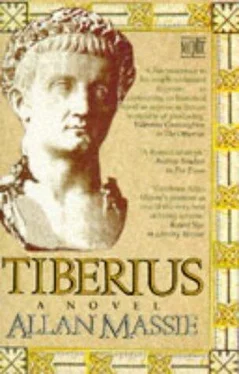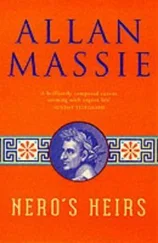Allan Massie - Tiberius
Здесь есть возможность читать онлайн «Allan Massie - Tiberius» весь текст электронной книги совершенно бесплатно (целиком полную версию без сокращений). В некоторых случаях можно слушать аудио, скачать через торрент в формате fb2 и присутствует краткое содержание. Жанр: Исторические приключения, на английском языке. Описание произведения, (предисловие) а так же отзывы посетителей доступны на портале библиотеки ЛибКат.
- Название:Tiberius
- Автор:
- Жанр:
- Год:неизвестен
- ISBN:нет данных
- Рейтинг книги:5 / 5. Голосов: 1
-
Избранное:Добавить в избранное
- Отзывы:
-
Ваша оценка:
- 100
- 1
- 2
- 3
- 4
- 5
Tiberius: краткое содержание, описание и аннотация
Предлагаем к чтению аннотацию, описание, краткое содержание или предисловие (зависит от того, что написал сам автор книги «Tiberius»). Если вы не нашли необходимую информацию о книге — напишите в комментариях, мы постараемся отыскать её.
Tiberius — читать онлайн бесплатно полную книгу (весь текст) целиком
Ниже представлен текст книги, разбитый по страницам. Система сохранения места последней прочитанной страницы, позволяет с удобством читать онлайн бесплатно книгу «Tiberius», без необходимости каждый раз заново искать на чём Вы остановились. Поставьте закладку, и сможете в любой момент перейти на страницу, на которой закончили чтение.
Интервал:
Закладка:
How could such a life be eulogised? Only in empty, high-sounding phrases, obviously, with much talk of private virtues (which indeed the poor man did not lack) and with noble, not unveracious, platitudes about the malignity of fortune. These platitudes had nevertheless to be modified, since they should not in any wise reflect upon the victor and favourite of fortune, Augustus, his successor as Livia's husband, who would be standing on the speaker's right hand.
Accordingly, my introduction to the art of public oratory was to spout disingenuous rhetoric.
Cant.
I have distrusted rhetoric ever since, even while acknowledging that its mastery is a necessary part of education.
Four years later, after Actium, my stepfather Augustus prepared to celebrate the triumph granted him by the Senate and the Roman people in honour of his achievements in the war against Egypt. There was cant here too, for no one was allowed to remind us that Roman citizens had been the chief victims of his wars. Instead all attention was concentrated on Egypt.
"Will Cleopatra walk in chains, mama?" "What do you children know of Cleopatra?" "That she'th a bad woman who sedutheth Romans," Julia said.
"That's no way for a little girl to talk. Do you want your mouth washed out with soap?"
"It'th what I heard Uncle Marcuth Agrippa thay."
She gave a little pout, holding strawberry-pink lips open and thrust forward. I was twelve then, so Julia must have been ten. But she already knew — had always known as if by nature — how to act, tease and provoke. Augustus at that stage liked the three of us to behave as if we were indeed brothers and sister — Julia is of course the child of his second marriage to the appalling Scribonia, one of the few women I have ever met who is as disagreeable and generally awful as the reputation which precedes her. Livia was always less certain that we should be encouraged to think of ourselves as siblings.
"What does sedutheth mean?" Drusus asked.
"It's seduces," I said. "Julia only says sedutheth because she's lost a front tooth. Anyway, Julia, Marcus Agrippa isn't really our uncle, you know. He can't be because he's a plebeian."
"Quite so," Livia said, and changed the subject.
Augustus liked us, however, to speak of Agrippa as our uncle; he was always eager that his supporters should feel they were a family; later, when Livia wasn't about, he upbraided me for the way I had spoken of his friend.
"If you grow up to be half the man Agrippa is," he said, "you'll be twice the man your own father was. And don't speak of plebeians in that silly way. If it weren't for plebeian blood, Rome wouldn't have an empire…"
He was right of course, and I came to appreciate Agrippa later, but then I could only think that my stepfather himself was essentially plebeian. I took his irritation as further evidence of his inferiority to the Claudians and of his lack of true nobility.
He had his revenge in the arrangements of his triumph. His nephew Marcellus was granted the honour of riding on the leading trace-horse, while I was relegated to an inferior position.
Cleopatra did not of course walk in chains, as she deserved to do. She had escaped him, by means of the now famous asp.
Two years later Augustus declared that he had restored the Republic. (I shall treat of this more fully, and philosophically, at a more appropriate stage of my history.) Marcellus was ecstatic.
"There never was such a thing," he said, again and again. "Such a surrender of power."
"I don't understand why Daddy should choose to give up power," Julia said. "It seems strange to me, after fighting so long to win it." She had quite lost her lisp, you observe.
"Yes," I said, "very strange."
I look up from the terrace on which I am writing this, and gaze over the evening sea and it is as if I can see reflected there our childish faces, as we strove with the dawning of our political understanding. I see Marcellus, six months older than I — and how much younger? — candid, beautiful, insipid. He reclines on a couch, in languid attitude that cannot disguise his animal energy, and yet looks, as always, as if he has fallen into a pose to delight a sculptor. I see Julia, the childish gold of her hair already darkening to that colour for which I have never found the right epithet, her blue eyes set rather far apart and moist at the edges, her lips always a little open. (Livia used to say she had breathing difficulties but I have always thought that the habit indicated her greed for experience.) And myself? When I try to envisage myself a shadow falls, and my face withdraws into the dark.
So we argued the matter and I have forgotten what we said, but the impression of that evening remains warm. We could hear the din and bustle rise from the forum below. Julia was eating a peach, and the juice trickled down her chin, to be retrieved by that quick, pointed tongue. Marcellus strove to convince us of Augustus' nobility and generosity in handing the Republic back to the Roman people, and Julia laughed and said,
"Daddy's not noble, he's clever, he's much too clever to do that. I'm only a girl and my interest in these political affairs is strictly limited, but I know perfectly well that you don't fight civil wars for fifteen years in order to give the dice back to your enemies and tell them to play the game again in their own way. If you take things at face value, Marcellus, you're a fool. Of course, you are a fool. I'd forgotten that."
She was quite right. Marcellus was a fool, a beautiful fool certainly, but all the more fool for that, because he was eaten up with self-love. "He's just like Narcissus, or Hyacinthus, isn't he?" Julia once said to me. "One of these silly Greek boys who fell in love with their own beauty." So from that day we called him The Hyacinth.
"You're different," she said to me, and put her arms round my neck. "You sit there like a wise man and say nothing. Nobody knows what you think, do they, Tiberius? I think that's clever."
And she kissed me. It wasn't a child's kiss. Or a sister's. It lingered on my lips.
But Augustus did not think Marcellus a fool. He thought him a golden youth and adored him. I believe Livia tried to warn him that he was in danger of making an ass of himself, but he was infatuated with the boy. Of course Marcellus was the son of his sister Octavia, whom he had always thought perfect and who now aroused feelings of guilt in him because he had compelled her to marry Mark Antony for political reasons; and the boy's father, C. Claudius Marcellus, had been one of his earliest supporters. (The Claudii Marcelli were, of course, cousins of mine.) But this wasn't the real reason for the enthralment in which Augustus was held by his nephew; and, despite the sneers of Roman gossip, it wasn't a vicious attachment either. The truth is that in Marcellus Augustus saw what he longed to be, and knew, of course, that he couldn't: a natural aristocrat, spontaneous, generous, idealistic; impulsive, a being born to be adored. His stupid love for Marcellus represented his surrender to a suppressed part of his character; it represented the wish that life is not what it is but an idyll.
He took us on campaign in Gaul when we were both very young. By this time — though I wasn't yet aware of it — he had already decided that Marcellus and Julia should marry. In that way he would, he fondly thought, continue to possess the two people the immature side of his nature most adored. (It was a different, and more worthy, side that loved Livia.) He was asking for the impossible of course, forgetting that neither could remain eighteen.
He loved to question us in the evening, to extract our views on life, and then try to correct them; he has always been a natural teacher. He told us that the business of government was service. "The only satisfaction," he said, "is the work itself. The only reward, the ability to continue the work. It is our task to bring law and civilisation to the barbarians. The true heroes of our empire are the countless administrators whom history will never know…"
Читать дальшеИнтервал:
Закладка:
Похожие книги на «Tiberius»
Представляем Вашему вниманию похожие книги на «Tiberius» списком для выбора. Мы отобрали схожую по названию и смыслу литературу в надежде предоставить читателям больше вариантов отыскать новые, интересные, ещё непрочитанные произведения.
Обсуждение, отзывы о книге «Tiberius» и просто собственные мнения читателей. Оставьте ваши комментарии, напишите, что Вы думаете о произведении, его смысле или главных героях. Укажите что конкретно понравилось, а что нет, и почему Вы так считаете.












